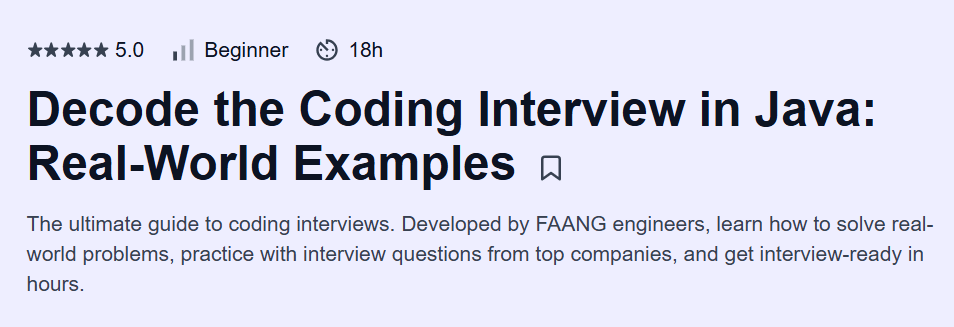What will you learn in Decode the Coding Interview in Java: Real-World Examples Course
Master essential Java data structures and algorithms for coding interviews
Understand time and space complexity and Big O analysis
Apply problem-solving patterns (two pointers, sliding window, recursion) in Java
Practice coding clean, optimized solutions to arrays, strings, trees, graphs, and DP challenges
Gain confidence for technical interviews at top tech companies
Program Overview
Module 1: Java Foundations & Problem Solving
⏳ 1 week
Topics: Java syntax refresher, collections framework, complexity analysis
Hands-on: Implement basic algorithms (sorting, searching) and analyze their performance
Module 2: Arrays & Strings
⏳ 1 week
Topics: Two-pointer, sliding window, frequency counting
Hands-on: Solve “Longest Substring Without Repeating Characters” and “Array Pair Sum” problems
Module 3: Linked Lists & Stacks/Queues
⏳ 1 week
Topics: Singly/doubly linked lists, stack/queue operations using
DequeHands-on: Implement “Reverse Linked List” and “Valid Parentheses” in Java
Module 4: Trees & Graphs
⏳ 1 week
Topics: Binary tree traversals, BST operations, BFS/DFS on graphs
Hands-on: Code “Lowest Common Ancestor” and “Graph Cycle Detection”
Module 5: Recursion & Backtracking
⏳ 1 week
Topics: Recursive patterns, call stack, pruning, backtracking techniques
Hands-on: Tackle “N-Queens” and “Permutations” with Java recursion
Module 6: Dynamic Programming & Greedy
⏳ 1 week
Topics: Memoization vs. tabulation, greedy strategy patterns
Hands-on: Solve “Coin Change” and “Longest Increasing Subsequence”
Module 7: Mock Interviews & Optimization
⏳ 1 week
Topics: Interview etiquette, code optimization, space/time trade-offs
Hands-on: Conduct timed mock interviews with real Java questions
Module 8: Capstone Challenge
⏳ 1 week
Topics: End-to-end interview simulation, system design primer
Hands-on: Complete a full-length, multi-problem coding interview in Java
Get certificate
Job Outlook
Strong DSA skills in Java are critical for roles at FAANG and other tech leaders
Positions include Software Engineer, Backend Developer, and SDET
Salaries range from $100,000 to $180,000+ based on company and location
Mastery of these topics vastly improves placement and promotion prospects
Specification: Decode the Coding Interview in Java: Real-World Examples
|
FAQs
- Prior basic knowledge of Java syntax is recommended but not mandatory.
- The course includes a refresher on Java collections, loops, and OOP concepts.
- Hands-on exercises reinforce Java skills while learning algorithms.
- Beginners can build confidence through step-by-step coding practice.
- Emphasis is on problem-solving patterns rather than complex Java theory.
- Includes timed coding exercises similar to real interviews.
- Covers arrays, strings, linked lists, stacks, queues, trees, graphs, and DP.
- Mock interview sessions build confidence and problem-solving speed.
- Emphasizes clean, optimized, and maintainable Java code.
- Prepares learners for FAANG-level and other competitive technical interviews.
- Teaches patterns like sliding window, two pointers, recursion, and backtracking.
- Focuses on recognizing patterns to solve unfamiliar problems efficiently.
- Exercises show how to apply patterns to multiple coding scenarios.
- Enhances algorithmic thinking beyond memorizing solutions.
- Builds skills to approach complex interview questions methodically.
- Includes timed mock interviews with real Java problems.
- Covers code optimization and space/time complexity trade-offs.
- Teaches interview etiquette and best practices for whiteboard coding.
- Provides feedback mechanisms to improve coding style and efficiency.
- Capstone challenge simulates end-to-end interview experience.
- Dedicate 4–6 hours per week to complete modules and exercises.
- Focus on one data structure, algorithm, or pattern per session.
- Regularly practice mock interviews and timed coding challenges.
- Document solutions and insights to track progress and areas for improvement.
- Use community or peer support for guidance and feedback on coding problems.





